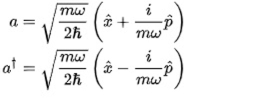Given recent threads involving Krauss about something being created from nothing here is the science perspective.
The concept of nothing is very much tied in with the modern or non classical version of a vacuum which is a quantum field in the lowest energy level.
You can’t divorce a field from nothingness or a vacuum.
This idea comes from a seemingly unrelated topic in classical physics the Simple Harmonic Oscillator (SHO).
An example of a SHO is a weight attached to a spring.
Pulling down on the weight and letting it go results in oscillation.
The Hamiltonian or total energy H of the SHO is defined as;

The first term on the right is the kinetic energy for the SHO in terms of the momentum p.
The second term is the potential energy stored in the spring with frequency ω and displacement x.
In early to mid 20th century scientists came up with Quantum Field Theory (QFT) where the field can be quantized like the energy levels associated with scalar particles such as electrons in atoms.
Each point in spacetime is defined by a SHO.
In this case the quanta of the field are the scalar particles which can be destroyed and created by annihilation and creation mathematical operators defined as follows.

Expressing the Hamiltonian for the SHO in terms of the creation and annihilation operators gives;

Where N is the number operator is defined as;

The state |n > is not the state of a single particle but is the state of the field with n particles or quanta present.
The eigenstates of the Hamiltonian for the field are of the form.

which is analogous to the quantum mechanical equation for a single particle.

Here the energy levels for the field are;

The lowest energy state occurs when n=0 and E = ħω/2 ≠ 0 where there are no particles or quanta which defines the vacuum.
Hence spacetime or a vacuum can never be totally empty and is supported by experiment such as the Casimir effect.
In fact you can get something from “nothing” as the “nothing” in this case is not totally empty.
The concept of nothing is very much tied in with the modern or non classical version of a vacuum which is a quantum field in the lowest energy level.
You can’t divorce a field from nothingness or a vacuum.
This idea comes from a seemingly unrelated topic in classical physics the Simple Harmonic Oscillator (SHO).
An example of a SHO is a weight attached to a spring.
Pulling down on the weight and letting it go results in oscillation.
The Hamiltonian or total energy H of the SHO is defined as;

The first term on the right is the kinetic energy for the SHO in terms of the momentum p.
The second term is the potential energy stored in the spring with frequency ω and displacement x.
In early to mid 20th century scientists came up with Quantum Field Theory (QFT) where the field can be quantized like the energy levels associated with scalar particles such as electrons in atoms.
Each point in spacetime is defined by a SHO.
In this case the quanta of the field are the scalar particles which can be destroyed and created by annihilation and creation mathematical operators defined as follows.

Expressing the Hamiltonian for the SHO in terms of the creation and annihilation operators gives;

Where N is the number operator is defined as;

The state |n > is not the state of a single particle but is the state of the field with n particles or quanta present.
The eigenstates of the Hamiltonian for the field are of the form.

which is analogous to the quantum mechanical equation for a single particle.

Here the energy levels for the field are;

The lowest energy state occurs when n=0 and E = ħω/2 ≠ 0 where there are no particles or quanta which defines the vacuum.
Hence spacetime or a vacuum can never be totally empty and is supported by experiment such as the Casimir effect.
In fact you can get something from “nothing” as the “nothing” in this case is not totally empty.
Last edited:

